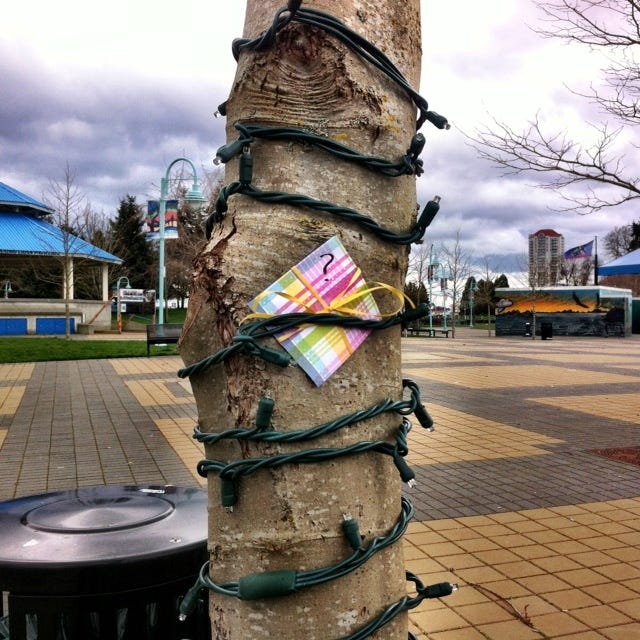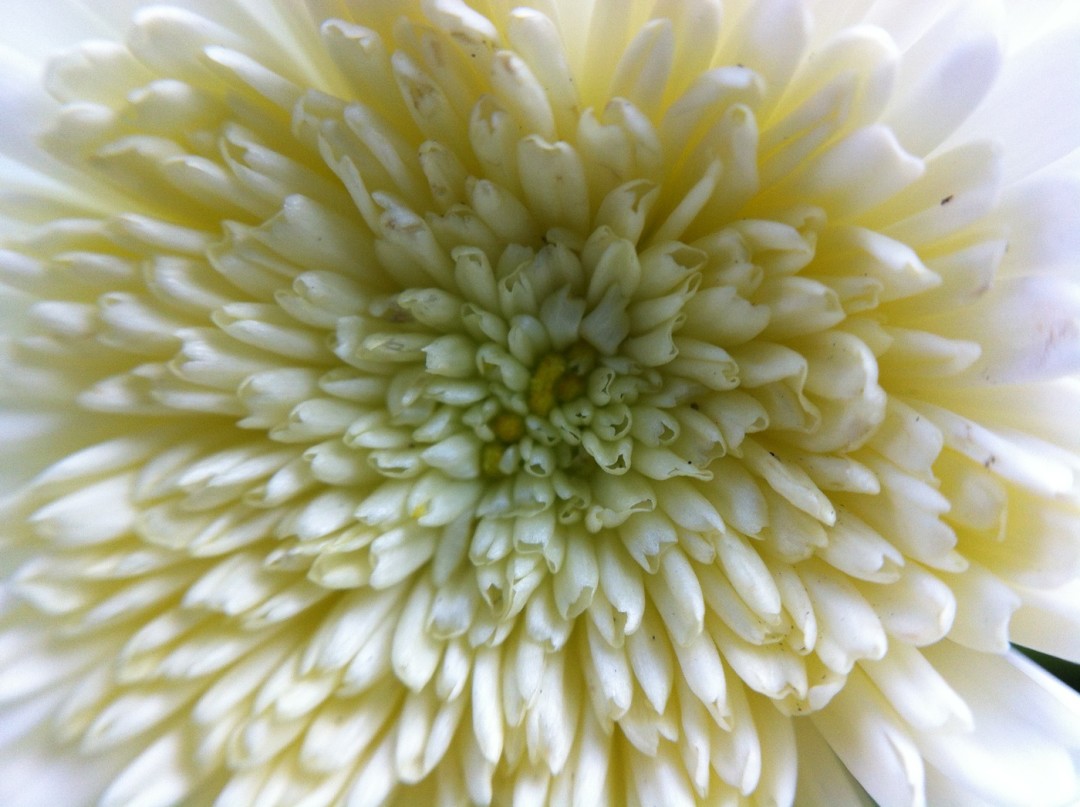In the summer of 2011, I’d been off antidepressants for more than a year, cigarette-free for eight months and had been building a toolkit of practices to help me find and maintain inner peace. I read about the 29-Day Giving Challenge, based on the book 29 Gifts: How a Month of Giving Can Change Your Life by Cami Walker. The premise was simple: Give something away each day for 29 days. I decided to give it a try.
By the end of the 29 days, my mood was better more consistently than it had been in a long time. The Challenge was such a powerful experience that I decided to do another 29-day round. And another. Of all the many (many, many) techniques I’ve used in my healing journey, giving is one of the most transformative, right up there with meditation and walking in nature.
One late afternoon, I was going to leave chocolates with a note attached at a bus stop — what I later came to call a Random Act of Chocolate — but as I was crossing the street, I saw a woman who looked like she was having a rough day. I offered them to her, and at first, she looked perplexed. Once she understood it was a gift, she beamed — not at me, specifically, but at the idea that a stranger was doing something to make her day brighter.
What ‘Giving’ Means
Giving isn’t about money. It can be, but the idea is to give whatever a person needs — time, attention, patience, money, help with a project, etc. The opportunities are infinite.
Mbali Creazzo, the medicine woman who prescribed the first 29-Day Giving Challenge to Cami Walker, says, “Give what feels scarce.” It works.
Whatever is difficult for me to give, I get exponentially more joy from giving. When I didn’t have enough money to live on, even leaving a quarter on a wall where children walk — that felt awesome. If I’m feeling pressed for time, just pausing to let someone go in front of me feels expansive. If I’m lost in my own thoughts, stopping to take a photo of some tourists (who invariably are taking pictures in rotating combinations) gets me out of my head and into my heart.
This is an important distinction, too: Giving benefits both recipient and giver when it’s done from the heart. Giving because “I have to” doesn’t shift anything. It’s like the difference between being polite and being kind: One is obligation and a social construct; the other is organic and, well, heartfelt.
A man whose face was etched by years on the street came up to me and stopped, a little unsteady on his feet. I immediately said, “I’m sorry, but I have nothing to give you today.” (That was the truth.) He said, “Oh, I don’t want anything from you! I’ve come to pay you back.” He pulled a small bunch of $5 and $10 bills out of his pocket — I’m guessing it was a day when Social Assistance was paid — and said, “A year ago, you gave me a gift card for the grocery store. And I want to repay you.” I thanked him and told him I couldn’t take it, that he didn’t owe me anything. He kept insisting that he did, so I said if he really wanted to repay me, to please give it to someone who needed it even more than he did. As I made my request, I referenced Ben, a local transient everyone knows — and this man looked me in the eyes and finished my sentence: “…Someone who really needs it. I know. You can feel it with your heart.” In that moment, his eyes were clear and bright; they shone with the joy of realizing that he had something to offer another person.
There Are No Wrong Recipients
The purpose of a giving practice is to keep the flow of kindness and generosity going, not to decide who is a worthy beneficiary. When my ego starts getting involved (i.e., judging who should/shouldn’t get a gift), my energy constricts — the opposite of what happens when I give freely. For me, this exercise is about trust: there is enough, and I don’t have to micromanage the whole thing.
I’ve sometimes paid ahead for a random stranger’s ice cream cone at a mom and pop store, and I’ve asked the owners to choose the recipient (it’s fun to involve other people in giving). They told me they scrutinized everyone, because they wanted to make sure it went to someone who really needed it — someone who was counting change for a treat. Which is a noble idea — and certainly those people need the help more than others. But for me, it’s not about determining who deserves a treat. What if someone wealthy came in and received a free ice cream cone? It could inspire them to generosity, and the ripple effect might create even more giving in the world.
I’ve discovered the secret to living in a world filled with kindness, generosity and compassion: It starts with me.
I generally haven’t minded giving cash to people living on the street, because I believe they know best what they need in that moment. I realize that what they think they need might be alcohol or drugs, and I’m okay with that. Who am I to judge? If I landed on the street, I have no idea what I might need to do to numb myself. It is only by grace that I’ve never been in that position. That said, addiction is a brutal thing, but withholding a few dollars from someone isn’t going to get them clean.
One of the things I hear most frequently is that people say they don’t want to give homeless people money that could be used on drugs or alcohol. In that case, gift cards for a local grocery store are a great gift and enable people to buy their own food. [In Canada, grocery stores don’t usually sell alcohol.]
Free will is one of the things that makes us human, yet for many living without basic necessities, the opportunity to exercise choice is rare — they eat what the soup kitchen has; they sleep wherever they feel least in danger (which is not to be confused with anything resembling safety). Being able to choose even as much as what kind of sandwich to eat can be a source of joy.
One morning, I saw a tall, skinny man in his 50s with a grey-flecked scraggly beard, holding a sign saying he was hitchhiking across Canada and was hungry. Next to him was a fraying canvas, metal-frame backpack that might have had its heyday in the 1970s, with an old cotton sleeping bag attached to the bottom. I gave him a grocery gift card for $10. I explained what it was, and that he’d have to go another kilometer to the grocery store. Once it sank in, he began crying and laughing at the same time. He couldn’t stop saying thank you, over and over, even as he wiped his eyes on dirty sleeves. He told me he hadn’t eaten in two days. His joy was contagious, and I felt elated, expanded and tearful myself. It felt really good to be the vehicle for someone else’s miracle.
Giving means relinquishing control. It’s possible that one of my gifts will go to somebody whose politics I’d find abhorrent, or whose behaviour I’d consider dodgy. The point is, we’re all connected, and that connectedness is more important than our differences.
Personal giving isn’t like giving to a charity, where you expect someone else to spend the money in a specific way, in line with your values. It’s not about the end result — what someone will or won’t do with a gift. It’s about the process. It’s about letting go and trusting.

Benefits of Giving
I’ve benefitted from a giving practice in more ways than I can identify — and probably more than I’m even aware of.
Connection
Giving gets me out of my head and takes the focus off me. As an extreme introvert and someone who spends a lot of time in solitude, it’s really easy for my mind to start in creating stories around situations in my life — and once it does that, I’m lost in a flight of thought until I remember to come back to the present moment (which, depending on the day… could be a long time).
By committing to give something away daily, I make a commitment to consciously place the focus on others. Every morning, when I wake up, instead of the usual litany of thoughts and fears, I’m driven by, “What can I give today?” It makes me pay attention to my surroundings, to look for opportunities to give (Does that woman looking at a map need directions? Maybe I can let that student get on the bus ahead of me. Is that elderly man at the register a few cents short?)
Appreciation
We all have so, so much more than we realize, and nothing helps us see that better than giving. A year ago, I was in a freelance famine: I had less than $20 to my name and no work on the horizon; I was two months behind on rent and bills, and I was scared — a fear not entirely unfounded — of becoming homeless myself. Yet even then, I was able to find ways to give. I could listen — really listen — to someone I might otherwise have tuned out. I could send a thank-you email to someone, or a text to say “I’m thinking about you.” (I have Internet access! I have a phone! There are people who love me!)
Every single time I give from my heart, I feel better. If I’m having a difficult day, that effect might only be for a second, but for that moment, it expands me.
Flow
Every spiritual teaching I’ve ever come across has said that giving precedes receiving. The more I give with an open heart, the more I open myself to receive. That’s not why I give, but it’s proven true time and time again. Giving creates flow. It has to flow out before it can flow in. We have to make space for it.
This pattern, which has played out in my life innumerable times over the past three and a half years, has shown me without a doubt that we are all connected; ultimately, we’re all rays emanating from the same sun. When I withhold from someone else, I’m cutting myself off from the whole.
All of us have an abundance of something that others need, and
all of us need something.
Giving shifts something in the universal fabric. Spending money on someone else has a different energetic charge than spending it on myself. Whenever I’ve given consciously, amazing things have come back to me in all areas of my life. It’s undeniable that there is a flow at work. But mostly, I give because it feels good. That doesn’t make it selfish. That makes it a win-win.
Since I began a giving practice, I have received so, so much, in so many areas of my life — and at first, I was hesitant to write about that. Embarrassed. In our culture, receiving help can be seen (by some) as a moral defect. Over time, I’ve become more comfortable with receiving because I recognize it as part of the flow, and because I know I’m actively contributing to that flow.
Many people are uncomfortable receiving, especially when it’s something they need, because they feel it makes them “less than” or a failure. It doesn’t. Money and status are both human constructs, and the idea that money equals status is a massively flawed human construct.
Happiness
Performing acts of kindness boosts all kinds of feel-good brain chemicals: oxytocin, serotonin and dopamine. But here’s the thing: witnessing acts of kindness also boosts those neurotransmitters.
I didn’t fully appreciate this until I stood behind two women in line at the drugstore. One left the line to check on a price, and the other handed the cashier some money to pay for the purchase, then she walked away. When the first woman returned, the cashier told her the other woman had already paid. Both the cashier and I had assumed the two women were friends. It turns out they’d never met. The first was simply helping out someone who needed it in that moment. Just witnessing that act of kindness, I felt as giddy as I do when a gift really meets someone else’s need.
Other studies have shown that kindness, compassion and generosity lead tobetter emotional and physical health, and even an extended life span.
Healing the Past
I was raised by a father who, from the time I was five or six, would ask every night, “What have you done today to justify your existence?” followed by, “What did you do for other people?” This wasn’t balanced with self-care; it was Puritanical self-denial. In a metaphysical sense, I now know that giving to other people is self-care — and maybe on a soul level (if not a personality one), that’s where he was coming from.
So for a long time, I hated the idea of giving, because it was tied up with all this family stuff. I didn’t want to give anything, because it felt like I had to. And I had that parent voice inside my head telling me I didn’t deserve anything, and I should spend my time and energy on someone else (pretty much anyone was more deserving).
I’ve heard variations on this family story from so many people, people who are kind and generous but balk at the idea of a giving practice, because they were raised to believe they didn’t deserve abundance. It was a zero-sum equation, and they’d always been left on the zero side.
If you give from a place of obligation, it doesn’t work; it doesn’t have the same impact. If you can find a way to give with an open heart, though, it can not only help you see what you have, but also the ways in which we’re all connected.
One summer afternoon, as I was walking, a short, plump First Nations woman in her 30s — who looked much older from her hard life — came up to me and said, in an earnest and almost girlish voice, “I don’t mean to be a pest, but I’m homeless.” She didn’t even ask for money. It broke my heart. I looked into her eyes and said, “You’re not a pest,” and she began to cry.
I told her she could always ask for help, and if I could help her, I would, but that I didn’t always have money myself. One time, she quietly asked me for a hug. I’m not a touchy-feely person — I can count on two fingers the number of people I’m comfortable hugging — yet for some reason, I felt no hesitation in obliging her request. Sometimes we’d talk for a few minutes, and I could see the sparkling eyes behind the traumas that life had dealt her. She just wanted to be seen. One day, I told her that I was sorry, but I didn’t even have money for my own food — and she tried to give me a few coins.
See the Human
As humans, we are so hungry for acknowledgment, and people living on the margins often are discarded as Other. Even if you can’t or don’t want to give someone money, try to see the human being behind the pain. (It’s difficult — acknowledging that amount of pain brings with it, well, pain, as well as guilt — which often quickly gives way to blaming: “He must be an addict; she must’ve done something to get kicked out of her apartment.” Maybe they did, maybe they didn’t. It’s not my place to judge.)
One of my pacts with myself is that, whenever anyone on the street asks me for money, regardless of whether I have it, I do my best to look into their eyes. If I don’t have money to give, I tell them that, but I try not to make them feel bad for asking. I can’t begin to imagine the humiliation involved in having to ask random strangers for money. Being in a position where there’s no other option than to ask for help is not a comfortable place. I know how Other I felt when I didn’t have enough to eat, when my only clothes were tattered and torn; I didn’t feel like a member of the human race. I remember how judged I felt by many people, because I’d been successful and then…I wasn’t, at least by society’s definition.
The woman who ran the ice cream shop used to think that I must be wealthy, to pay for a stranger’s ice cream cone. In fact, it’s the other way around: Giving has made my life richer.

